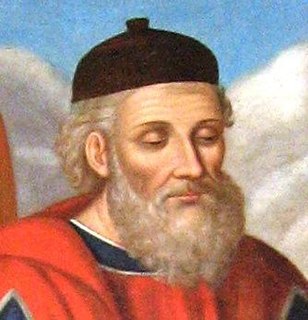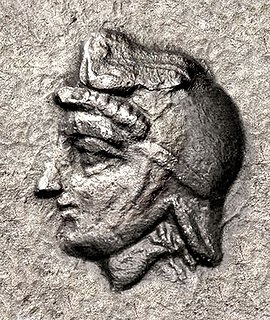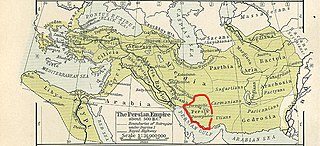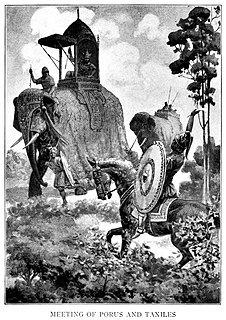
Alexander III of Macedon, commonly known as Alexander the Great, was a king (basileus) of the ancient Greek kingdom of Macedon and a member of the Argead dynasty. He was born in Pella in 356 BC and succeeded his father Philip II to the throne at the age of 20. He spent most of his ruling years on an unprecedented military campaign through Asia and northeast Africa, and by the age of thirty he had created one of the largest empires of the ancient world, stretching from Greece to northwestern India. He was undefeated in battle and is widely considered one of history's most successful military commanders.

Macedonia or Macedon was an ancient kingdom on the periphery of Archaic and Classical Greece, and later the dominant state of Hellenistic Greece. The kingdom was founded and initially ruled by the royal Argead dynasty, which was followed by the Antipatrid and Antigonid dynasties. Home to the ancient Macedonians, the earliest kingdom was centered on the northeastern part of the Greek peninsula, and bordered by Epirus to the west, Paeonia to the north, Thrace to the east and Thessaly to the south.

Ptolemy I Soter was a companion and historian of Alexander the Great of the Kingdom of Macedon in northern Greece, and eventually became a diadochi successor ruler over a portion of his former empire. Ptolemy became ruler of Ptolemaic Egypt and founded the Ptolemaic dynasty which ruled it until the death of Cleopatra in 30 BC, turning Egypt into a Hellenistic kingdom and Alexandria into a center of Greek culture.

Diodorus Siculus or Diodorus of Sicily was a Greek historian. He is known for writing the monumental universal history Bibliotheca historica, much of which survives, between 60 and 30 BC. It is arranged in three parts. The first covers mythic history up to the destruction of Troy, arranged geographically, describing regions around the world from Egypt, India and Arabia to Greece and Europe. The second covers the Trojan War to the death of Alexander the Great. The third covers the period to about 60 BC. Bibliotheca, meaning 'library', acknowledges that he was drawing on the work of many other authors.

Lysimachus was a Macedonian officer and diadochus of Alexander the Great, who became a basileus ("King") in 306 BC, ruling Thrace, Asia Minor and Macedon.
Marcus Fulvius Nobilior, Roman general, a member of one of the most important families of the plebeian Fulvia gens.

Autophradates was a Persian Satrap of Lydia, who also distinguished himself as a general in the reign of Artaxerxes III and Darius III.
Mithridates II, third king of Pontus and son of Ariobarzanes, whom he succeeded on the throne.
Bas was the first independent ruler of Bithynia. He ruled for fifty years, from 376 to 326 BC, and died at the age of 71.

Ariarathes I was the satrap of the Satrapy of Cappadocia under the Achaemenid Empire from 350 BC to 331 BC, and the Hellenistic King of Cappadocia from 331 BC until his death in 322 BC.

Balakros, also Balacrus, the son of Nicanor, one of Alexander the Great's "Somatophylakes" (bodyguards), was appointed satrap of Cilicia after the Battle of Issus, 333 BC. He succeeded to the last Achaemenid satrap of Cilicia, Arsames.
Arsinoe of Macedonia was the mother of Ptolemy I Soter, king of Egypt.
Nicaea was a Greek Macedonian noblewoman and was a daughter of the powerful regent Antipater. Her mother's name is unknown. She was born and raised in Macedonia while her father was governor of Macedonia during the reign of Greek King Alexander the Great.
Philip was satrap of Sogdiana. He was first appointed to this position by Alexander the Great in 327 BC. He retained his post, as did most of the satraps of the more remote provinces, in the arrangements which followed the death of the king in 323 BC; but in the subsequent partition at Triparadisus in 321 BC, he was assigned the government of Parthia instead. Here he remained until 318 BC, when Peithon, who was then seeking to establish his power over all the provinces of the East, made himself master of Parthia, and put Philip to death.

Alexander was brother of Molon. On the accession of the Seleucid king Antiochus III, afterwards called the Great, in 223 BC, he entrusted Alexander with the government of the satrapy of Persis and Molon received Media. Up to that time, local rulers of Persis, the Fratarakas seem to have been in charge of the region, between circa 295 and 220 BC.
Archon was a Pellaean, appointed satrap of Babylonia after the death of Alexander the Great in 323 BC. He is probably the same as the son of Cleinias mentioned in the Indian expedition of Alexander. He perished in 321 in a fight against Docimus. An inscription in Delphi shows that Archon had taken part in both the Isthmian and Pythian Games of 333-332, winning some horse-races.

Taxiles was the Greek chroniclers' name for a prince or king who reigned over the tract between the Indus and the Jhelum (Hydaspes) Rivers in the Punjab region of the Indian subcontinent at the time of Alexander the Great's expedition. His local name was Ambhi, and the Greeks appear to have called him Taxiles or Taxilas, from the name of his capital city of Taxila, near the modern city of Attock, Pakistan.

Aulus Postumius Albus Regillensis was an ancient Roman who, according to Livy, was Roman dictator in 498 or 496 BC, when he conquered the Latins in the great Battle of Lake Regillus and subsequently celebrated a triumph. Many of the coins of the Postumii Albi commemorate this victory of their ancestor, as in the one pictured. Roman folklore related that Castor and Pollux were seen fighting in this battle on the side of the Romans, whence the dictator afterwards promised a temple to Castor and Pollux in the Roman Forum.
Spurius Postumius Albus Regillensis was a patrician politician of Ancient Rome. His filiation as reported in the Fasti Capitolini suggests he was the son of Aulus Postumius Albus Regillensis, although it must be observed that no great dependence can be placed upon genealogies from such early times. He was consul in 466 BC. He was one of the three commissioners sent into Greece to collect information about the laws of that country, and was a member of the first decemvirate in 451 BC. He commanded, as legatus, the center of the Roman army in the Battle of Corbio, in which the Aequians and Volscians were defeated in 446 BC.

Menes of Pella, son of Dionysius, was one of the officers of Alexander the Great; and after the Battle of Issus was admitted by the king into the number of his somatophylakes, in the place of Balacrus, who was promoted to the satrapy of Cilicia.
















